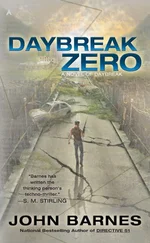McIntyre nodded slowly. “I suppose Cam wanted to make absolutely certain that we knew why he hadn’t sworn you in, because if I thought the rightful President under the Constitution was being prevented from taking office… well, I’d have to take action. I took an oath, and I meant that oath.”
Cameron nodded. “It seemed best that no matter what we decided, the military leadership should at least know what was going on.”
Phat said, “I guess I’m stuck with asking the question then. I’ve spent most of my time making sure our troops have some mobility and that our units are holding together. I purposely haven’t followed the policy debates. So… Dr. Weisbrod, if you wouldn’t mind… I understand that Mr. Nguyen-Peters thinks there is a war, and based on the events of the past few months—and particularly today—it sure looks like a war to me. Maybe you can explain why you think it’s not a war? If that is what you think.”
“That may be the politest way I’ve ever been asked to prove I’m not crazy.” Weisbrod relaxed, and sketched out the basic ideas and evidence from Arnie’s work in a few minutes. “The problem is that most of the analysis we would use to locate the enemy, formulate strategy, and fight the war would be coming from Arnie’s analyses—but those same analyses show that there’s no enemy, no war, just a self-extinguished system artifact that left behind an undetermined number of booby traps.”
“Well,” McIntyre said, “it seems… it’s an odd idea. So it’s a system artifact that grew out of people sharing their self-hatred with each other—through the net… wallowing in it, really, I guess… and it took over and called all these forces into being, including planting the sleeper bombs… and now it’s gone, except for whatever traps it left behind, and here we are in the ruins. I hope you’ll pardon me when I point out that even if it’s true, an old soldier like me would probably rather believe in a real bombable, shootable enemy.”
Weisbrod smiled. “I guess I’d understand that.”
Phat was picking at his fingers nervously; he looked up, and asked, “So suppose Dr. Weisbrod is unfit to be president? I guess not believing in the existence of the enemy, in wartime, would qualify as unfit—unless there really isn’t a war or an enemy, I mean. But suppose you declare him unfit, Mr. Nguyen-Peters. What would you do then?”
“In a general way, I’d ask our military and our intelligence agencies to find the people, organizations, nations, whatever, responsible for these terrible attacks; defeat and subjugate them; bring them to justice and to unconditional surrender so that they can never do it again. Then rebuild the country, find ways around all the Daybreak roadblocks to technology; I suppose it’s a hundred or thousand year program.”
“And Dr. Weisbrod? If you are made president?”
“It’s surprisingly similar in many ways. I’d start from the idea that the enemy is gone and was never exactly a person or people anyway, though for public morale we should haul some of Daybreak’s minions in front of a judge. Because I wouldn’t spend years chasing an enemy that doesn’t exist, we’d still have more of our nuclear ships, operating aircraft, all the tools to make the job of reconstruction easier and faster. If we try to fight a war, no matter how careful we are with the little bit of remaining high-tech hardware we have, it will be gone before we realize that there never was any war, and it’s all been a tragic error. I just don’t think there’s a war, and therefore I think there’s better, more urgent use for resources that we’ll be losing very soon anyway, the way we lost the USS Reagan , or the way the reconnaissance planes are going now.”
The silence stretched.
Cameron said, “I’ve never had a duty this painful before. Graham, I am going to hold you incommunicado, and announce that in view of our wartime situation, although you are the president, you have been moved to a confidential location for security reasons; I’ll have to issue orders over your name, I suppose, and I’m sorry for that as well. Gentlemen, I’ll need a few chosen troops to help carry out this decision, and they are to be absolutely discreet—and as gentle and kind about this business as it is possible to be. We need to accomplish this before Graham leaves this room.” He visibly forced himself to look directly at Graham. “I’m sorry.”
“I’m sorrier for your broken oath than I am for me being locked up,” Graham said quietly.
“I think I’m keeping my oath. It’s my heart that’s breaking.” Cam turned to the two generals, who were standing frozen, numb, unsure what to do. “General McIntyre, I’m making that officially an order; please detain Graham Weisbrod incommunicado, with all the reasonable comfort—”
“Sir, no. With all due respect, I cannot obey that order, in light of my oath.”
“General Phat, please relieve General McIntyre and carry out my orders.”
Weisbrod watched, numbly, as it all happened; it wasn’t until he and McIntyre were being led between armed guards to their new home that he thought of something to say. “General, do you play chess?”
“Not as well as I should.”
“Me either. Perhaps we’ll get better with all the practice.”
“Mr. Nguyen-Peters,” General Phat said, “may I have a word with you?”
“Of course.”
“I don’t much care for this situation. I am thinking strongly of following McIntyre into arrest. You would probably find Grayson, the next officer in line, to be a much more cooperative person.”
“I see. I had thought that too; I had also thought that if General Grayson takes over the Army, the Army is very likely to take over everything. But I don’t think I can safely try to remove him at the moment.”
“Which is one reason why I will stay in, at least until we get Grayson shunted somewhere harmless. Instead, it occurs to me that as NCCC you can do pretty much anything you want, is that right?”
“I’m supposed to restore Constitutional government as soon as it’s feasible and I have qualified people to do it with.”
“Well, then. So as long as you pursue that goal, you can do whatever you like?”
“Subject to my personal sense of honor.”
Phat nodded. “I see you have one; I see it eating you alive. All right, here are my conditions for not resigning. First of all, move the temporary government off this base. The United States should be run from a civilian capital city, not an Army base. Second, full elections in ’26. Give us a Congress and President, put together a Supreme Court, do whatever it takes, but I want to see a civilian Constitutional government—and not one where you get to decide who it is or who’s elected. Third, the minute it takes power, resign.”
Cam asked, “You realize that you’re imposing more difficulty on the government during a wartime crisis?”
“If some difficulty, as you call it, is going to stop us from following and having our Constitution, sir… well, then it’s not much of a Constitution, our oaths don’t mean much, and it’s all just a game, eh? Congress made me an officer, Directive 51 made you the dictator, and none of that would exist without that Constitution. It created us; we owe it some loyalty, even in the face of ‘difficulties.’”
“So I’m not going to bargain you into any easier arrangement, am I?”
“Not a chance, sir. I’m a good general and a poor negotiator, and I’ll only do the thing I’m good at. And if you agree, I will expect you to keep your word.”
Cameron sat down, and said, “How long before I have to move to a civilian capital?”
“I’ll give you a month.”
“And… well, there’s already an existing plan, it’s in one of the classified annexes to Directive 51. I’m sure we can elect a House twenty months from now, which is actually on schedule. We can stagger the Senate terms the way they did back in 1788, elect a third of them to six-year terms, a third to four years, and a third to two. We could elect a president for two years, to get back on the original four-year cycle that started in 1788, but I’d rather put one in for four years and just start from a slightly different beginning date. Probably have him appoint a three-man Supreme Court, next guy takes it to five, next guy takes it to seven, and so on; that’s more or less what they did by accident back at the start. We have rules for creating provisional states if need be, out of areas where there’s no government, but I’d rather just leave some states present-and-not-voting… those are details, I think about those too much… yeah, it can be done. I’d rather take ten years about it, but I can do it in two.”
Читать дальше












